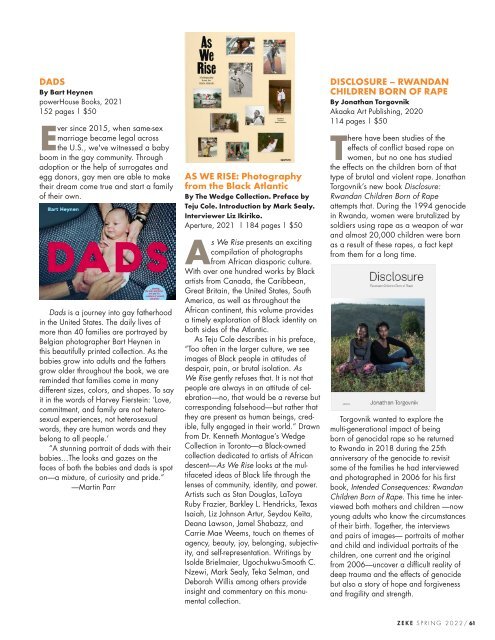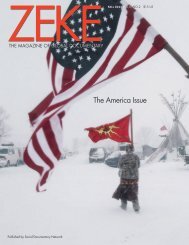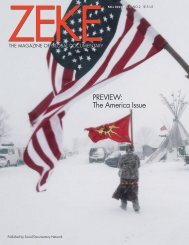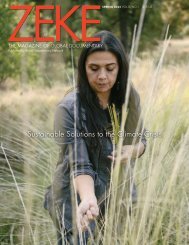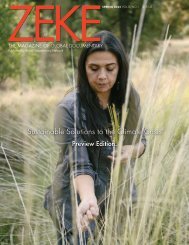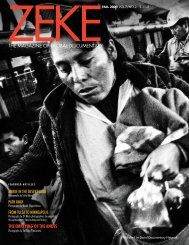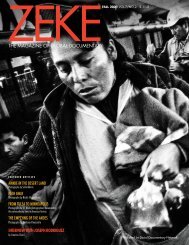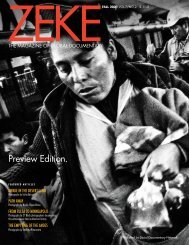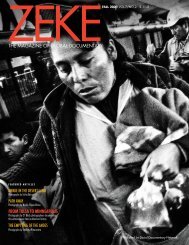ZEKE Magazine: Spring 2022
Sustainable Solutions to the Climate Crisis Indigenous Fire by Kiliii Yuyan The Indigenous Peoples' Burn Network is training others in an ancient technique of ecological restoration, which is to safely light low-intensity fires in wet seasons that remove the small fuels on the forest floor. Nemo's Garden by Giacomo d'Orlando Nemo’s Garden—the world’s first underwater greenhouses of terrestrial plants—represents an alternative farming system dedicated to those areas where environmental conditions make the growth of plants almost impossible. Permagarden Refugees by Sarah Fretwell The Palabek refugee settlement in Northern Uganda, with the staff of African Women Rising’s (AWR) Permagarden Program, works with refugees to utilize the existing resources—seeds, rainfall, limited land, and “waste”—and together build an agriculture system designed to help the environment regenerate and get stronger as it matures. Sustainable Solutions to the Climate Crisis by Antonia Juhasz Interview with Kiliii Yuyan by Caterina Clerici Dispatches from Ukraine by Maranie Staab Book Reviews Edited by Michelle Bogre
Sustainable Solutions to the Climate Crisis
Indigenous Fire by Kiliii Yuyan
The Indigenous Peoples' Burn Network is training others in an ancient technique of ecological restoration, which is to safely light low-intensity fires in wet seasons that remove the small fuels on the forest floor.
Nemo's Garden by Giacomo d'Orlando
Nemo’s Garden—the world’s first underwater greenhouses of terrestrial plants—represents an alternative farming system dedicated to those areas where environmental conditions make the growth of plants almost impossible.
Permagarden Refugees
by Sarah Fretwell
The Palabek refugee settlement in Northern Uganda, with the staff of African Women Rising’s (AWR) Permagarden Program, works with refugees to utilize the existing resources—seeds, rainfall, limited land, and “waste”—and together build an agriculture system designed to help the environment regenerate and get stronger as it matures.
Sustainable Solutions to the Climate Crisis
by Antonia Juhasz
Interview with Kiliii Yuyan by Caterina Clerici
Dispatches from Ukraine by Maranie Staab
Book Reviews Edited by Michelle Bogre
You also want an ePaper? Increase the reach of your titles
YUMPU automatically turns print PDFs into web optimized ePapers that Google loves.
DADS<br />
By Bart Heynen<br />
powerHouse Books, 2021<br />
152 pages | $50<br />
Ever since 2015, when same-sex<br />
marriage became legal across<br />
the U.S., we've witnessed a baby<br />
boom in the gay community. Through<br />
adoption or the help of surrogates and<br />
egg donors, gay men are able to make<br />
their dream come true and start a family<br />
of their own.<br />
Dads is a journey into gay fatherhood<br />
in the United States. The daily lives of<br />
more than 40 families are portrayed by<br />
Belgian photographer Bart Heynen in<br />
this beautifully printed collection. As the<br />
babies grow into adults and the fathers<br />
grow older throughout the book, we are<br />
reminded that families come in many<br />
different sizes, colors, and shapes. To say<br />
it in the words of Harvey Fierstein: ‘Love,<br />
commitment, and family are not heterosexual<br />
experiences, not heterosexual<br />
words, they are human words and they<br />
belong to all people.’<br />
“A stunning portrait of dads with their<br />
babies…The looks and gazes on the<br />
faces of both the babies and dads is spot<br />
on—a mixture, of curiosity and pride.”<br />
—Martin Parr<br />
AS WE RISE: Photography<br />
from the Black Atlantic<br />
By The Wedge Collection. Preface by<br />
Teju Cole. Introduction by Mark Sealy.<br />
Interviewer Liz Ikiriko.<br />
Aperture, 2021 | 184 pages | $50<br />
As We Rise presents an exciting<br />
compilation of photographs<br />
from African diasporic culture.<br />
With over one hundred works by Black<br />
artists from Canada, the Caribbean,<br />
Great Britain, the United States, South<br />
America, as well as throughout the<br />
African continent, this volume provides<br />
a timely exploration of Black identity on<br />
both sides of the Atlantic.<br />
As Teju Cole describes in his preface,<br />
“Too often in the larger culture, we see<br />
images of Black people in attitudes of<br />
despair, pain, or brutal isolation. As<br />
We Rise gently refuses that. It is not that<br />
people are always in an attitude of celebration—no,<br />
that would be a reverse but<br />
corresponding falsehood—but rather that<br />
they are present as human beings, credible,<br />
fully engaged in their world.” Drawn<br />
from Dr. Kenneth Montague’s Wedge<br />
Collection in Toronto—a Black-owned<br />
collection dedicated to artists of African<br />
descent—As We Rise looks at the multifaceted<br />
ideas of Black life through the<br />
lenses of community, identity, and power.<br />
Artists such as Stan Douglas, LaToya<br />
Ruby Frazier, Barkley L. Hendricks, Texas<br />
Isaiah, Liz Johnson Artur, Seydou Keïta,<br />
Deana Lawson, Jamel Shabazz, and<br />
Carrie Mae Weems, touch on themes of<br />
agency, beauty, joy, belonging, subjectivity,<br />
and self-representation. Writings by<br />
Isolde Brielmaier, Ugochukwu-Smooth C.<br />
Nzewi, Mark Sealy, Teka Selman, and<br />
Deborah Willis among others provide<br />
insight and commentary on this monumental<br />
collection.<br />
DISCLOSURE – RWANDAN<br />
CHILDREN BORN OF RAPE<br />
By Jonathan Torgovnik<br />
Akaaka Art Publishing, 2020<br />
114 pages | $50<br />
There have been studies of the<br />
effects of conflict based rape on<br />
women, but no one has studied<br />
the effects on the children born of that<br />
type of brutal and violent rape. Jonathan<br />
Torgovnik’s new book Disclosure:<br />
Rwandan Children Born of Rape<br />
attempts that. During the 1994 genocide<br />
in Rwanda, women were brutalized by<br />
soldiers using rape as a weapon of war<br />
and almost 20,000 children were born<br />
as a result of these rapes, a fact kept<br />
from them for a long time.<br />
Torgovnik wanted to explore the<br />
multi-generational impact of being<br />
born of genocidal rape so he returned<br />
to Rwanda in 2018 during the 25th<br />
anniversary of the genocide to revisit<br />
some of the families he had interviewed<br />
and photographed in 2006 for his first<br />
book, Intended Consequences: Rwandan<br />
Children Born of Rape. This time he interviewed<br />
both mothers and children —now<br />
young adults who know the circumstances<br />
of their birth. Together, the interviews<br />
and pairs of images— portraits of mother<br />
and child and individual portraits of the<br />
children, one current and the original<br />
from 2006—uncover a difficult reality of<br />
deep trauma and the effects of genocide<br />
but also a story of hope and forgiveness<br />
and fragility and strength.<br />
<strong>ZEKE</strong> SPRING <strong>2022</strong>/ 61


